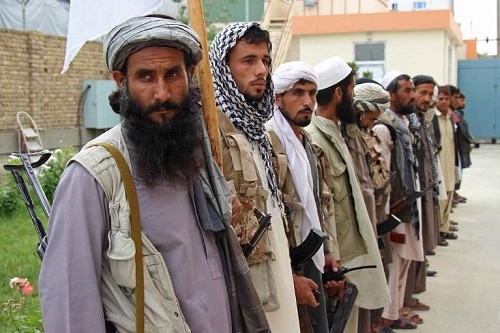AFP photo
By
Ruslan Mamedov
The past two weeks have seen developments that will determine the further course of the Afghan conflict. There was fierce fighting between Afghanistan’s armed units and the Taliban, particularly for the town of Ghazni southwest of Kabul. The approaching Eid al-Adha (Kurban Bairam) Festival spurred renewed attempts to achieve a truce, but to no avail. In the meantime, Pakistan got a new prime minister, whom his enemies have dubbed Imran “Taliban” Khan.
President Ashraf Ghani of Afghanistan earlier announced a temporary ceasefire with the radical Taliban (banned in the Russian Federation) on the occasion of the Eid al-Adha (Kurban Bairam) Festival. Moreover, his office proposed a three-month long truce, which, given the real state of affairs on the ground, looked quite ambitious.
In addition, the situation is complicated by other forces. So, during Ghani’s Eid al-Adha speech, the presidential palace was attacked with rockets. Later, Directorate 4, a Russian Telegram channel, reported, citing extremists’ sources, that “Islamic State claimed responsibility for the Kabul attack.”
Last time, the truce, occasioned by the end of the Ramadan fasting and the Eid al-Fitr Festival, lasted from June 7 to 17, with the Taliban refusing to extend the ceasefire. The US welcomed the present ceasefire proposal. US Secretary of State Mike Pompeo went on record as saying that Washington was ready to support and facilitate direct peace talks between the Afghan government and the Taliban.
But many regional and Afghan players may perceive this and similar US statements as a sign of weakness. Against this background, the Taliban could step up fighting to strengthen or regain some of its negotiating positions. The inter-Afghan negotiating process itself is being washed down between various venues and, in the final analysis, is yielding no positive results. The real influence on the situation on the ground is not projected from Doha, Dushanbe, Islamabad or Moscow. Russia plans to hold talks on its own venue on September 4 (with the head of Qatari office, Sher Mohammad Abbas Stanikzai, expected to lead the delegation).
The latest initiative of this kind was implemented in Doha on July 23. The Taliban, which has an office in the Qatari capital, approved a meeting with high-ranking US representatives. Judging by reports in open sources, these direct Taliban-US talks (held without Afghan government representatives) led to no breakthroughs. But the Trump administration has signaled certain shifts in its approach to Afghanistan. While earlier Trump made tough and even militaristic statements that targeted all enemies in Afghanistan (listing among these even Pakistan), today the administration seems to have gauged the scale of the problems. Even though they still are eager to emerge victorious, this wish is at variance with their capabilities and the realities. This is why the Americans have invigorated the negotiations with a view to integrating a moderate wing of the Taliban with the Afghan authorities.
But the important point is the opinion of the Taliban itself on the ceasefires offered by Kabul and its US allies. The Taliban leader, Hibatullah Akhundzada, has rejected any possibility of a ceasefire because, as claimed by his followers, the Americans would take advantage of a ceasefire to postpone any decision-making on their presence in Afghanistan, while the Afghan government is trying to recover its strength. Taliban representatives obviously believe that they are in a better position and have an edge over their adversaries, holding as they do the initiative and advancing. They see Kabul’s ceasefire offer only as an admission of its weakness.
After the death of the most authoritative Taliban leader, Mullah Omar, and his successor Mullah Akhtar Mansur, it might seem to many, particularly to those in Washington, that the Taliban would lose strength and mobility. But even though there were internal changes, it proved possible to preserve its structure and control mechanisms. The new Taliban leader, Mullah Hibatullah Akhundzada of Kandahar — an “Islamic scholar,” former “judge,” one of the more consistent supporters and proponents of the Taliban ideals, and a close associate of Mullah Omar and Mullah Akhtar Mansur — and his deputy, Mullah Jakub (the son of Mullah Omar), managed to stabilize the situation. Akhundzada had enough authority to stem ferment within the Taliban ranks (as believed, this could be achieved in the absence of rivals, ISIS included, in Afghanistan). He consolidated his forces and turned against the Afghan government, extending Taliban-controlled territories.
In Mullah Mansur’s time, negotiations could also be facilitated by the Pakistani Inter-Services Intelligence (ISI). But the Americans sent a drone to kill him in Balochistan, Pakistan, an infringement of the country’s sovereignty that outraged the Pakistanis. US drones are at the center of a controversy between Islamabad and Washington, being the cause of increasingly more deaths. The new Pakistani Prime Minister Imran Khan, has repeatedly raised this subject. What is more important, Imran Khan believes that peace in Afghanistan must be achieved through talks and that the Taliban is one of the key players. Imran Khan represents the Pakistanis, who think that Pakistan should not be involved in “someone else’s wars,” such as the US war in Afghanistan. In this sense, talks are seen as the only solution.
Verbally, the peace process is supported by all outside players. Conferences and workshops with and without the participation of internal Afghan actors continue to be held. But the conflict settlement formula is not even the inclusiveness. To begin with, it is necessary to identify the players who have real influence on the ground and then get them to compromise. The US-Russia format, also involving Pakistan, Iran and China, would seem to be beneficial as well. But currently the Afghan matter is addressed by three pairs of countries — US-India, China-Pakistan, and Russia-Iran — with each of these tandems following an agenda of its own. As for the Taliban under Hibatullah Akhundzada, it has two traditional demands: the introduction of Sharia law and the withdrawal of the US military from Afghanistan. Under these circumstances, the transformation of the Taliban itself is as difficult a process as the search for a compromise between the outside and domestic Afghan players.
This article was originally published by the RIAC and is reproduced with their kind permission
Ruslan Mamedov
MSc in International Relations, Program Coordinator (MENA) at the Russian International Affairs Council.



No Comments Yet!
You can be first to comment this post!